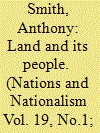|
|
|
Sort Order |
|
|
|
Items / Page
|
|
|
|
|
|
|
| Srl | Item |
| 1 |
ID:
103090


|
|
|
| 2 |
ID:
126964


|
|
|
|
|
| Publication |
2013.
|
| Summary/Abstract |
This study, based on analysis of survey data collected in 2011 in Taiwan and Hong Kong, shows that cultural identification explains the choice of country and national identities and that Chinese nationalism emerges as an important factor connecting the minds of people in mainland China, Taiwan, and Hong Kong.
|
|
|
|
|
|
|
|
|
|
|
|
|
|
|
|
| 3 |
ID:
114201


|
|
|
|
|
| Publication |
2012.
|
| Summary/Abstract |
This article challenges the common wisdom that national identification always leads to xenophobic attitudes toward immigrants. Analyzing cross-national survey data from dozens of countries reveals how the relations between national identification and xenophobic attitudes toward immigrants vary according to country citizenship policy. The more inclusive the citizenship regime, the weaker the relations are between national identification and xenophobia. In fact, in countries with full jus soli law there are, on average, negative relations between national identification and xenophobia while in other countries there are positive relations between the two. These findings are used to discuss the ways conceptions of nationhood are institutionalized in citizenship policy from a socio-psychological perspective.
|
|
|
|
|
|
|
|
|
|
|
|
|
|
|
|
| 4 |
ID:
147663


|
|
|
|
|
| Summary/Abstract |
Based upon the data from qualitative studies of eight national minorities between the Baltic and the Danube, this article investigates the formation of European identification among members of the minority groups representing ‘split nations’ along the new eastern borders of the enlarged EU. The analysis reveals mechanisms of the formation of supranational identification by focusing on the relationships between subnational, national and European identifications to ascertain the degree of interconnectedness of these identification levels. These relationships are examined in the context of the potential impact of perceived ethnic conflict and utilitarian expectations of socio-economic and cultural gains from the process of European integration.
|
|
|
|
|
|
|
|
|
|
|
|
|
|
|
|
| 5 |
ID:
120359


|
|
|
|
|
| Publication |
2013.
|
| Summary/Abstract |
From the late eighteenth century onwards, increasing numbers of visual artists came to identify with their nations and with the homeland and its people. This development was strongly influenced by growing national cultural support and regulation of the arts by academies, art schools, museums and art markets in Western Europe. On a subjective level, the Rousseauan movement of a 'return to Nature', Herder's espousal of vernacular cultural self-expression and, above all, the widespread Romantic cult of authenticity, were potent influences on the inner self-identification of visual artists after 1800, and were manifested in the novel importance accorded to landscape and rural genre painting in Western Europe. Here I consider the role of national sentiment, the 'return to Nature' and the cult of authenticity, first in landscape paintings by Paul Sandby, J. M. W. Turner and John Constable in early nineteenth-century Britain, and then in the rural genre paintings of Jean-Francois Millet and Jules Breton in nineteenth-century France and Josef Israels, Anton Mauve and Vincent Van Gogh in the later nineteenth-century Netherlands. Their work reveals how nineteenth-century visual artists became inwardly identified with the 'land and its people', and how they in turn contributed, especially through prints and engravings, to the dissemination of national imagery and a cultural nationalism.
|
|
|
|
|
|
|
|
|
|
|
|
|
|
|
|
| 6 |
ID:
110044


|
|
|
|
|
| Publication |
2012.
|
| Summary/Abstract |
In recent decades geographic mobility in Thai rural communities has intensified and broadened in scope. As a result, the lives of many and perhaps most rural citizens no longer (if they ever did) fit easily with popular portraits of rurality as stable, isolated, and intrinsically different from the dynamic modernity of urban Thailand. Nevertheless, as the rhetoric of the ongoing national political crisis illustrates, rural-urban divisions remain powerful symbols in contemporary Thai society. This article examines how Thai mobilities both reflect and contribute to processes of self-imagining and national identification, posing questions for conventional understandings of the "rural-urban divide" in Thailand. Dominant discourses of urbanity and rurality contrast sharply with villagers' lived experiences of rural-urban flows and other mobility practices. Drawing on fieldwork with migrants and others in rural and urban Thailand, as well as on related scholarship, this article explores some of the ways in which Thai mobilities engender conflicting experiences of and desires for cultural citizenship and national belonging.
|
|
|
|
|
|
|
|
|
|
|
|
|
|
|
|
| 7 |
ID:
116636


|
|
|
|
|
| Publication |
2012.
|
| Summary/Abstract |
It remains unknown if theoretical perspectives concerning party identification can be usefully applied to the formation or consolidation of state identification. Taiwan presents a unique case for exploring the nature of state identification, not only because of the ambiguity concerning its official name, but because its citizens have been struggling with a hard choice between Chinese identification, an identification based on cultural heritage that is considered to be the root of its legitimacy, and an emerging national identification with an independent Taiwan which is beginning to consolidate. Theoretical work is needed to explain the nature and the volatility of state identification in the light of conventional wisdom about party identification. This study concentrates on clarifying the relationships between party identification, national/ethnic identification, and state identification. It will show how these concepts are interwoven and how the idea of a "state identification crisis" originated. It will also shed light on studies about conflict process and political psychology.
|
|
|
|
|
|
|
|
|
|
|
|
|
|
|
|
| 8 |
ID:
121869


|
|
|
|
|
| Publication |
2013.
|
| Summary/Abstract |
Research shows that the more people identify with a national in-group, the more their citizenship representation becomes in line with the citizenship discourse attached to this national-identity. However, although national identification may lead to a preference for a specific citizenship representation, national identification might itself depend on preexisting citizenship representation preferences. In line with this, a longitudinal study among Flemish-Belgian high-school students (N?=?275) showed reciprocal relations between national identification and citizenship representation. A second study among Flemish-Belgian high-school students (N?=?407) then showed that strength of national identification does not simply depend on preexisting citizenship representation preferences but on the (mis)match between such preferences and the citizenship representation perceived to be attached to a national-identity. In addition, results showed that the relation between national identification and out-group attitudes depends on the national-identity under consideration.
|
|
|
|
|
|
|
|
|
|
|
|
|
|
|
|
|
|
|
|
|